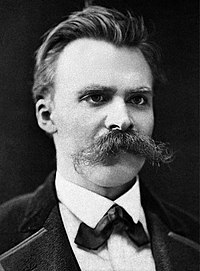
Photo from wikipedia
ABSTRACT In this article I argue that we should understand Nietzsche’s doctrine of eternal recurrence as the ideal of life affirmation opposed to philosophical pessimism, the view that life is… Click to show full abstract
ABSTRACT In this article I argue that we should understand Nietzsche’s doctrine of eternal recurrence as the ideal of life affirmation opposed to philosophical pessimism, the view that life is not worth living. I first articulate Nietzsche’s psychological account of pessimism as a vengeful focus on the past and an aversion to time understood as transience. I then consider the question of why a person with the opposite psychological orientation – a creative relation to the future and an endorsement of time – would will the eternal recurrence of all things. My answer appeals to Nietzsche’s notions of will to power and the redemption of the past from its senselessness. The interpretation of eternal recurrence that emerges from this approach takes Nietzsche’s vision of a great, world-redeeming individual to be integral to his doctrine of eternal recurrence. This is just one way in which it differs from common interpretations of eternal recurrence as a cosmological theory or thought experiment.
Journal Title: Inquiry
Year Published: 2019
Link to full text (if available)
Share on Social Media: Sign Up to like & get
recommendations!